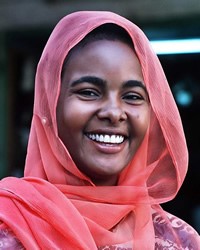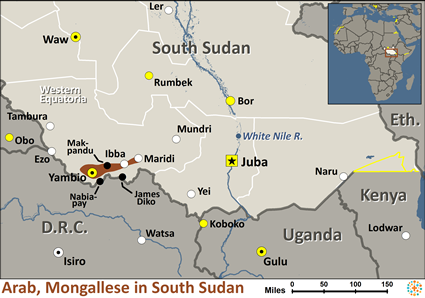The Mongallese Arabs of South Sudan are part of the Sudanese Arab people within the Arab World affinity bloc. This people group is only found in South Sudan, very close to the border of the Democratic Republic of the Congo. This people group became "Arabized" when Arabs invaded North Africa, causing many tribes and pre-Islamic Saharan nomadic groups to be displaced. These invasions also overran and absorbed, to some extent, the less powerful communities of black farmers, Jewish artists and Berber refugees who lived in and around the oases and trading centers of the northern desert. For this reason, many different groups exist throughout North Africa today, including these tribes, who have become "Arabized. "
Most of the Arabized tribes are farmers but not the Mongallese Arabs. Most of them are nomadic herdsmen, traveling from place to place with their herds of cattle and camels in search of better grazing lands. They have trouble finding adequate water for their livestock and medical care. Local people are rightfully afraid that the livestock of these nomadic Arabs will spread diseases to their herds. The Mongallese live in temporary camps due to their constant migrating tendencies. They usually live in dome-shaped shelters made of branches covered with grass. The Mongallese tribe dresses much like any other Arabic communities. They typically wear sandals, cotton turbans or caps and long-sleeved cotton tunics called djellabas. Their lives revolve around important ceremonies such as birth, marriage, death, and the first haircut and circumcision for boys. The most elaborate of all ceremonies is the marriage ceremony. Polygamy (having more than one wife) is a common practice among the Arabized tribes. However, according to Islamic law, a man cannot have more than four wives. After marriage, the newlywed couple generally lives with or near the husband's parents. However, in some groups, the young couple will live with the wife's family until after the birth of the first child.
One obstacle is the distinct dialect of the Mongallese Arabs. Another obstacle is their devotion to Mohammed and Islam.
With the death of Mohammed in AD 632, the Arabs erupted from the desert pastures of Arabia and overran the lands to the east and west. They intermarried with the local North African tribes and introduced them to Islam. The tribes began adopting the traditions and practices associated with Islamic culture. The spread of Islam continued and became even more advanced in the sixteenth and seventeenth centuries. Today, virtually all of the Arabized tribes, including the Mongollese, are 100% Muslim.
The majority of the Arabized tribes, including the Mongollese, are not being ministered to by mission agencies and there are few believers living among them. There is a great need for workers and intercessors for these precious people.
Pray that gospel recordings, Bibles, Christian broadcasts and other literature will become easily available in Bimbashi Arabic for the Mongollese. Ask the Lord to call people who are willing to go to South Sudan and share Christ with these Muslims until they have their own Christ-ward movement. Pray that the Christians of South Sudan will be compelled to take the gospel to their unreached neighbors, including the Mongollese. Ask the Lord to raise up Christian medical teams to work among the Mongollese and other Arabized tribes.
Scripture Prayers for the Arab, Mongallese in South Sudan.
| Profile Source: Joshua Project |

























